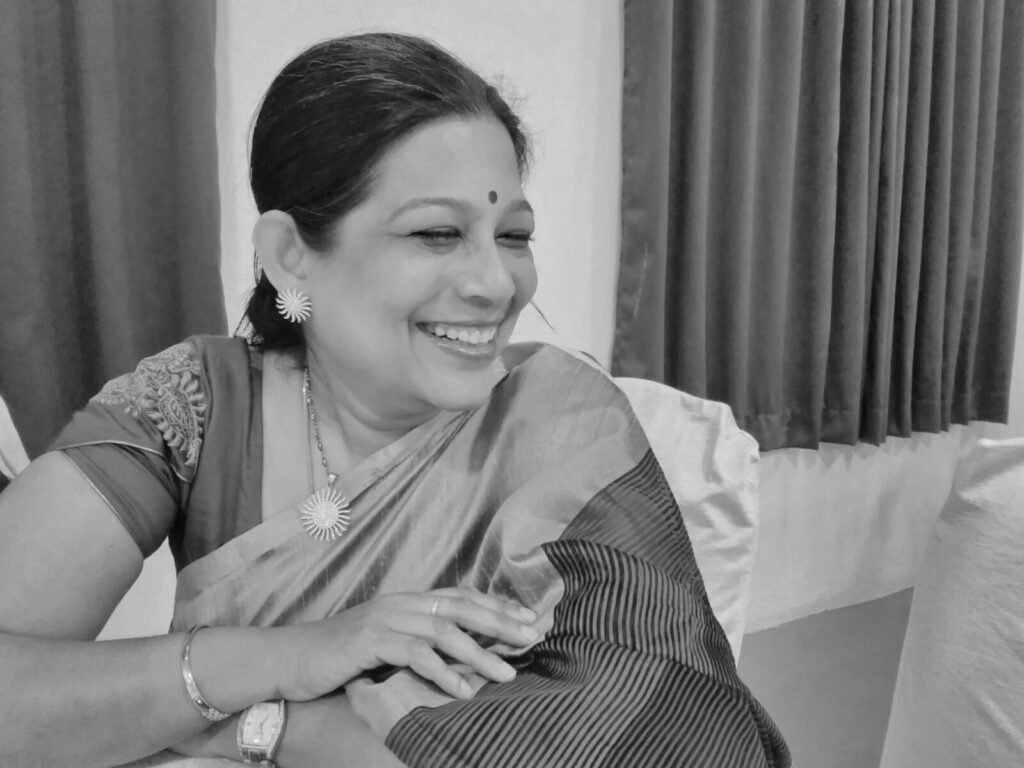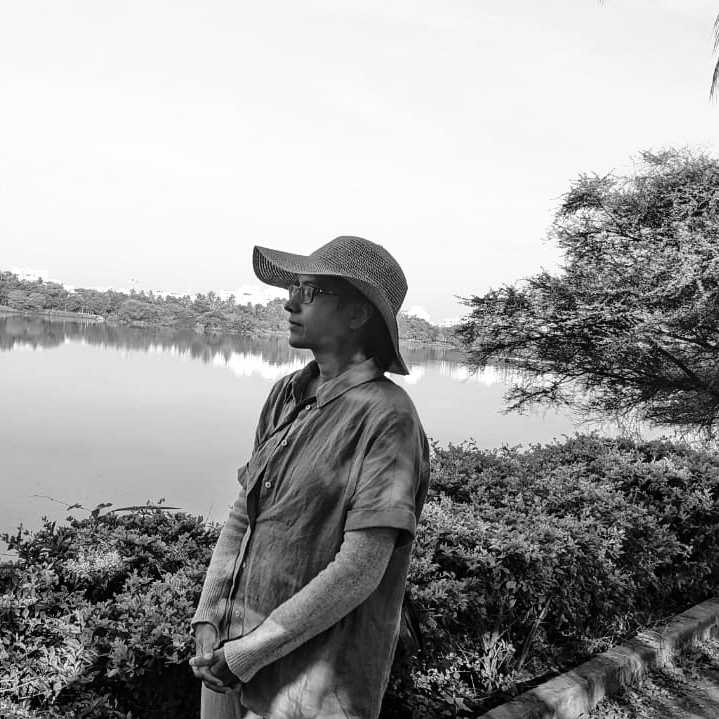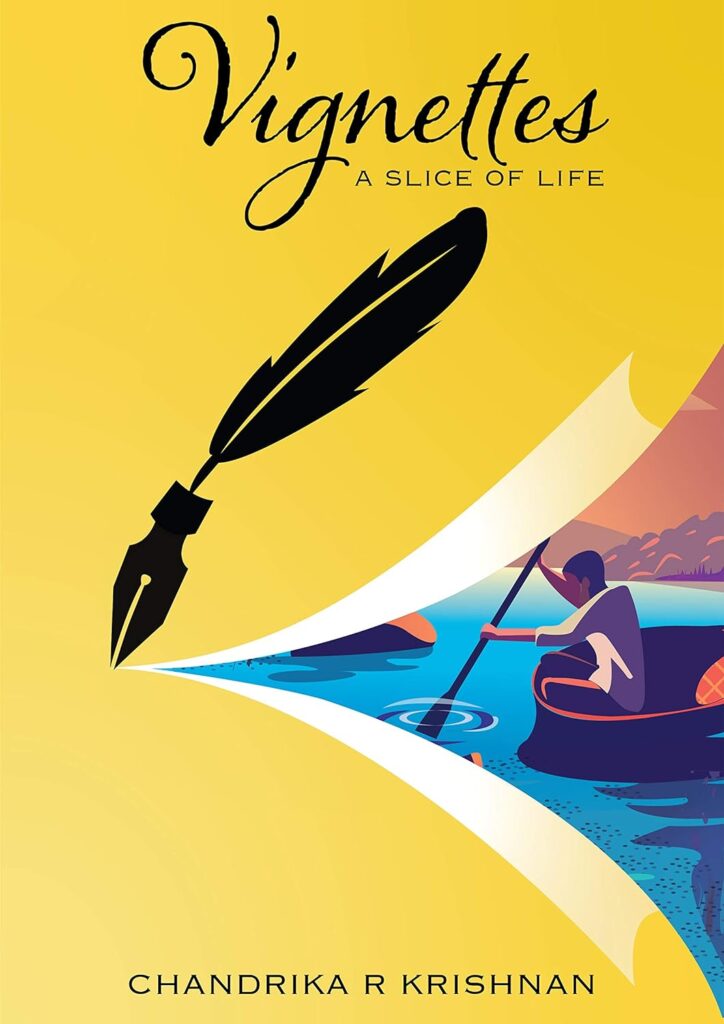Chandrika R Krishnan in conversation with Amita Basu, Interviews Editor, MPV
Type Chandrika R Krishnan on Google, and it will throw up articles and stories from the most prominent papers and lit mags in the country. A powerhouse of a writer, she has published more than 250 articles and stories in various print and online media including The Hindu, Deccan Herald, Mint, Quint, Reedsy, Funny Pearls, among others.
Chandrika was one of the very first writers that we worked with; her flash story ‘Nothing Like Food To Work Its Magic’ was published in our first formal issue in April, 2022. Her warmth, generosity of spirit, and joie de vivre shines through in all her writings, her photographs, and even in her correspondence with us over mail. It’s no wonder then that the self-confessed people’s person volunteers at a local hospital and at a Seva Centre, and conducts storytelling sessions for the underprivileged.
In this interview, Chandrika talks to MeanPepperVine’s Interviews Editor Amita Basu about her love of tea, her lifelong fascination with the social sciences, self-publishing her book Vignettes, and how her travels influence her creativity and writing journey.

In your travel piece “A ‘Soulfull’ City,” set in Benaras, you talk about “[sitting] on the steps [of the ghats], oblivious to the dirt left behind by millions of feet that must have doubtless traversed the same steps.” With the influx of tourists and the decline in religious faith, do you think the significance of Benaras in the global imagination has changed?
I don’t think faith has declined. I believe that fear and belief in equal measures will continue to hold sway in the human mind as long as faith in the afterlife remains. At the same time, there is an element of romance about Benaras, and it is that vein of romance that the authorities have mined to promote tourism. The launch of the cruise and the installation of tents alongside the river, geared particularly towards foreign tourists, have worked. The mystique surrounding Benaras has remained, and has been capitalised for commercial purposes – witness how the Ganga Aarti strikes a fine balance between faith and spectacle.
You mention not having visited Benaras before, perhaps because it was not the right time in your life. We’re all familiar with this feeling that a trip, a book, or another kind of experience has found us at exactly the right time. How do you think you might’ve responded to the city if you’d visited it in your teens?
I lived in Lucknow for eight years after my wedding. I had many opportunities then to visit Benaras, had I wanted to. But the river Ganges, particularly in Benaras, was infamous for its filth. My husband confirmed this, as he did a lot of work-related travel to the city. So, I guess my spiritual or religious reasons for visiting the city back then were not strong enough to make me brave the filth. I preferred visiting Haridwar.
This time around, we visited Benaras to complete certain rituals for our departed parents. Maybe, with age, I’d mellowed down, or maybe it was the fact that the Ganges is far cleaner than ever before. The locals, too, are keen on keeping it clean and stopping tourists from dirtying it. I felt there was a marked improvement in the way the city overall is maintained, despite the profusion of paan stains.
Had I visited the place in my teens, I might not have sat on the steps, but the river would still have enthralled me the way it did at Haridwar and Rishikesh. But in my teens I would not have appreciated Benaras’s illustration of the hold that Hinduism has on humanity.
You’ve published more than 250 articles and stories over the decades. In “Soulfull City,” you talk about visiting Benaras in a time of family crisis. From my conversations with you, your intense experience of this city seems to have played a part in unblocking your creative juices after this crisis. Does travel often play a cathartic or reflective role for you? What other weapons do you deploy against writer’s block?
Yes, it does, though it doesn’t necessarily translate into publication! Travel helps my writing in subtle ways. It is a time for reflection and for living in the present. Travelling is deeply meditative. It allows me to move beyond the personal troubles that often haunt my day-to-day life. I like temple runs as I am deeply appreciative of architecture. I can spend hours browsing museums. I can lose myself in the mountains and, equally, by the seashore or any waterbody. I can walk for hours and do a modicum of climbing. I also like restaurants by the highways. Besides travelling, I find sitting at my workstation and just organising my folders a great way to cure writer’s block. And did I forget to mention my cup of tea?
Your flash story “Nothing Like Food to Work Its Magic” documents a few moments at a key transition point in the relationship between a Tulu woman and her new American daughter-in-law. This flash story documents how sharing in the cooking, eating, and relishing of food can forge bonds that transcend time and place. Any experiences of your own where food played a pivotal role?
We are a family of food lovers. In my family circle, food holds centrestage. No one leaves our house without eating something, whatever the time may be. I believe food helps iron out a lot of stresses; it’s also a great way to bond. I wrote a piece in Whetstone, an international magazine, about Indian podis. It was well-received. Another story in The Hindu Noshtalgia was based on Meenakshi Amman’s culinary book, a must-have book for newlywed Tamil wives in the 1980s. I’ve written three stories and two articles revolving around food; I like each of them for different reasons. I enjoyed creating the two characters in ‘Nothing Like Food to Work its Magic.’
You and I met via the Internet Writing Workshop, a critique and discussion group. I only joined in 2020, but the feedback I’ve received from the group, and from critique partners elsewhere, has already transformed my writing. You also belong to various in-person writers’ groups. What has your experience been like with these groups?
I enjoy these groups, but I also feel that belonging to too many, as I do, is a drawback. I want to participate in all of them, and end up not doing as much as I would want to. Social media has that effect, too, where we often feel left out or worried about missing out. Maybe other people handle this aspect of group membership better, without feeling guilty.
Your site mentions a lifelong fascination with the social sciences. Many of your pieces that I’ve critiqued via the IWW address contemporary social problems, often involving the abuse, harassment, or exploitation of women. How has your interest in social issues informed your writing and worldview?
I am a people person. I can talk to (and hopefully connect with) people across ages, genders, and socioeconomic backgrounds. I also listen – though my children would disagree with me on this! I strongly believe that our lives would be better if we were more aware of others and followed the principle of kindness. I think that people don’t read public-interest news stories enough. If they did, they wouldn’t fall for similar scams! Right from our infamous traffic chaos to better governance, many issues could be sorted if we had better civic sense and took pride in treating our country and treated our surroundings with more respect. Social Studies classes, particularly Civics and Environmental Studies, should be taken seriously.
Many writers claim not to know where their ideas come from, but you know exactly where – tea! You’re a connoisseur of tea. Tell us about your perfect cuppa.
Tata Kadak Tea, but only sugarless lemon tea, and preferably brewed by my husband! My Dimaak ki batti(mental flashlight) operates only on tea. I drink quite a few cups every day.
You’ve written about motherhood and parenting, both your own experiences and the shift in the cultural perception of mothers. My other writer friends who are parents tell me that parenthood has made them more empathetic and patient in general, but that it also revolutionises one’s priorities, such that there’s no pain, fear, or joy comparable in magnitude with those involving their children. How has motherhood shaped you?
I always wanted to be a mother. I love children and enjoy their company, particularly small ones. I started my career as a teacher. I knew then that I wanted to be a mother as well as a teacher.
Motherhood makes you think beyond yourself. Having said that, I’m not a helicopter mother. I often feel that my children have grown up, not thanks to me, but in spite of me! I never sat with them for academics beyond their fifth standard, never focused on marks, and have generally been there for them without breathing down their necks. I also believe that we might have valuable perspectives on other people’s problems, so my writing focuses on those perspectives. I love giving ‘gyaan’ to others – can’t say I didn’t warn you!
You’ve self-published Vignettes, a collection of flash stories. Tell us about your experience of writing, publishing, and promoting this book.
My experience with publishing on Amazon was hassle-free. I was helped by Salini Vineeth, a very generous writer and member of the writing community. Regarding marketing, I lag hugely. I haven’t done much about promoting the book, so I feel it’s gone largely unread. In today’s world of social media, I think consistent self-promotion is necessary and also accessible, and if you want to succeed in publishing, you can’t shy away from it. I, on the other hand, am a here today-missing tomorrow kind of person when it comes to social media.
What role has reading and writing played in your life?
There is nothing more enjoyable to me than talking! I love to yak, yak, and yak. Hence, both reading and writing have given me new things to yak about – be it in the classroom, where I was never at a loss for words and always eager to share an anecdote, joke, or story, or among friends, where I often come across as someone who knows more than I really do! Reading has also helped me whenever I’ve needed to take a substitute class in schools – I had many puzzles and word games up my sleeves to entertain students.
Nathaniel Hawthorne, famous for writing intricate, suspenseful, highly emotional, often magic-realist fiction, said that the kinds of things he preferred to read were more like his contemporary Anthony Trollope’s realistic, large-canvas novels documenting ongoing social and political change in Britain. Do you find that the texts you like reading differ from the texts you produce? Or are your tastes more congruent?
My blog, Musings over a Cup of Tea, reflects my thoughts, which span the range from mundane to serious. But my blogposts are not so serious that they need deep reflection. I prefer fiction to nonfiction. I do not like outlandish themes or science fiction; I rarely enjoy fantasy. I prefer to read about real-life experiences.
My writings, too, are mostly experiential, or take off from something I’ve come across. After publishing a personal piece, I’m always afraid people will worry about talking to me any more!
In that respect, my tastes in reading and writing are almost on the same page.
You’ve been freelancing, as well as publishing fiction in paid venues, for decades now. How has the paying market changed over this period? What advice do you have for someone looking for a supplementary income stream via their writing?
I started my writing career with pieces in Woman’s Era, New Woman, Good Housekeeping India, The Hindu, and Deccan Herald. While in Indonesia, I wrote quite regularly in the Jakarta Post. All these journals paid me. Even if it was not amazing money, it was decent money. Payment for writing, particularly in Indian markets, has not risen commensurately with the cost of living, or with the writer’s effort. I did in recent years get paid handsome fees by Mint and Whetstone. But does this kind of money keep the pot boiling? I know of many serious writers who get paid more handsomely for their nonfiction than their fiction. But it’s hard work to pitch articles – you have to regularly study the market and then, if the pitch is accepted, write the piece in a short period. I do think there’s a much bigger market these days for writing in general. The opportunities are there.
You write fiction, nonfiction, and poetry. How do you decide – or know – what kind of piece a new idea is going to be?
I started by writing fiction. Fiction and flash fiction remain my first love. I call myself a reluctant poet, in the sense that I rarely write poetry, but then each poem comes to me quite spontaneously. I can never manage to write a prompt-based poem, or forms where you have to count the syllables. My style is mostly free verse, and I don’t force-fit my words to a rhyme scheme.
Nonfiction is something I ventured into in my teaching days. I had a lot to say about parenting, education, and other topics. My articles often arose from a discussion in the classroom or staffroom. My articles have been eclectic, or so I would like to think! I don’t do much reportage, but there has to be truth in what I say, so I do a bit of research for every piece. I also often invite experts to weigh in with their inputs.
_________________________

Amita Basu is the Columnist and Interviews Editor of MeanPepperVine. She loves Captain Planet, barefoot running, and George Eliot. If dozing in the sun all day were a viable career, she’d be a world-champion sunbather. Her superpowers are befriending any dog on earth, whistling tunefully (while being totally unable to sing), and combining five bright colours in one outfit. Five is the limit, though.
_________________________
Find The Mean Journal on Instagram @MeanPepperVine
